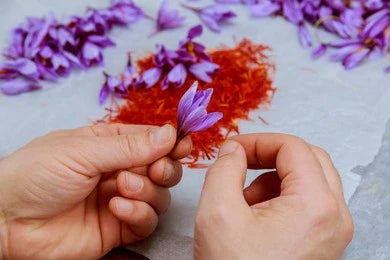This herb is known by its Latin name, Crocus sativus. Known by many names as saffron crocus or autumn crocus, this perennial herb blooms every year. This herb has a corm that has leaves, a flowering stalk, bracts, and a bracteole, according to its morphology.
This herb blooms in the fall with purple flowers. The height of this plant varies from 10 to 30 cm. Kesar blooms have a pleasant scent, and its stigma is colored a reddish-orange. Spice is made from the dried stigmas, which resemble threads from the flower.
It is known that Kesar herb grows in Eastern or Central Asia, the Mediterranean, Eastern Greece, and West Asia. In Jammu and Kashmir as well as throughout Himachal Pradesh, kesar is grown in India.
Classification
- Kingdom: Plantae
- Latin name: Crocus sativus
- Clade: Angiosperms
- Clade: Monocots
- Order: Asparagales
- Genus: Crocus
- Species: C. sativus
Other names of Kesar
- Sanskrit name: Agneeshekhar, Kashmiraj, Kumkum, Asrugvar, Rudhir, Shonit, Rakta, Kashmir, Kesar, Balhik, Ghusrun.
- Hindi name: Kesar
- Bengali name: Kumkum, Jafran
- Gujarati name: Kesar
- Marathi name: Kesar
- Tamil name: Kumkumappu
- Kannada name: Kesar
- Telgu name: Kumkuma pubba
- English name: Saffron
- Arabic name: Jafran
Medicinal Properties
|
Particular |
Hindi / Sanskrit |
English |
|
Rasa (Taste) |
Tikta, Katu |
Bitter, Pungent |
|
Guna (Physical Property) |
Snigdha |
Slimy |
|
Virya (Potency) |
Ushna |
Hot |
|
Vipaka (Post-Digestive Taste) |
Katu |
Pungent |
Effect on Dosha
It balances all three doshas (Vata, Pitta, and Kapha)
Ayurvedic Uses
- Kantida: This herb improves skin complexion and skin tone.
- Varnya: It enhances skin complexion.
- Vrana Shodhana: This herb cleanses the damages.
Medicinal Properties
- Anti-spasmodic
- Sedative
- Diaphoretic
- Carminative
- Antioxidant
- Anti-inflammatory
Indications of Kesar
- Poisoning
- Worm infestation
- Vomiting
- Melasma
- Freckles
- Asthma
- Cough
- Cold
- Smallpox
- Fever
- Stomach disorders
- Headache
- Insomnia
- Hiccups
- Eye diseases
- Cancer
- Atherosclerosis
- Alopecia
- Psoriasis
- Alzheimer's disease
- Premenstrual syndrome
- Worm infestation
Chemical Composition of Crocus Sativus
Chemical components found in kesar include riboflavin, thiamine, carotenoids, picrocrocin, terpenes, esters, and terpene alcohols.
The meal dishes have a vibrant golden-yellow color due to the inclusion of crocin, a carotenoid.
Health Benefits of Kesar
-
In Skin Disorders - Kesar has anti-inflammatory, anti-fungal, and antioxidant qualities. These qualities moisturize, lighten, and aid in healthy blood circulation. It improves the condition of the skin and lessens oiliness.
-
In Digestive Disorders - This herb's anti-inflammatory qualities aid in improving appetite and digestion. It helps with gastrointestinal issues, intestinal colic, and acidity.
-
In the Central Nervous System - "Crocein" found in saffron regulates the NMDA sensory receptor system. Its antidepressant qualities improve memory and activate the central nervous system. This plant is beneficial for treating insomnia.
- For the Male Reproductive System - Low sperm count, low motility, erectile dysfunction, and premature ejaculation are all treated by the antioxidant properties of Saffron plant. The "crocin" component of this herb repairs the harm done to the male reproductive system.
-
For Excretory System - It helps in the reduction of pollutants because of its anti-inflammatory, anti-nociceptive, and antioxidant qualities. It removes from the body extraneous and superfluous material.
-
During Pregnancy - Frequent consumption of Kesar milk during pregnancy can alleviate symptoms of nausea, morning sickness, gas, constipation, nausea, and vertigo.
Used for medicinal purposes
Kesar herb's stigma and stamen are used medicinally. Take 0.5–1 gram of powdered herb once or twice a day.
Used for Various Health Problems
The following are some of the ways that kesar herb can be used:
- Add roughly five to six stigmas of kesar herb to a glass of milk. For overall health, have one or two glasses of this milk.
- Make a paste out of sandalwood and kesar to use as a face pack. For skin issues like acne, pimples, dark circles, skin blushing, and increased fairness, use this pack.
- Use a herb paste composed of kesar to speed up the healing process for wounds.
- Combine a mixture of kesar herbs with rose water. Use this water on your eyes to enhance your vision.
- Drink saffron badaam milk every day to help heal the reproductive systems of men and women.
- For ailments including fever and headache, use sandalwood oil mixed with kesar paste.
- Men who have issues such as erectile dysfunction, poor sperm count, low motility, or premature ejaculation should take this herb on a daily basis.
- To lessen the severity of psoriasis, drink Kesar tea on a daily basis.
- Drink a herbal tea made with kesar, fennel seeds, licorice, cardamom, and chamomile if you have asthma.
- Kesar extract can be taken orally to alleviate the symptoms of depression.
Dosage
Take 0.5 to 1 gms of saffron

